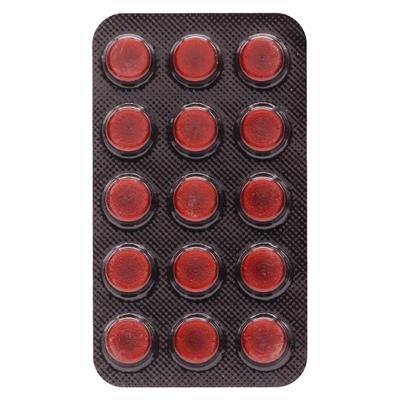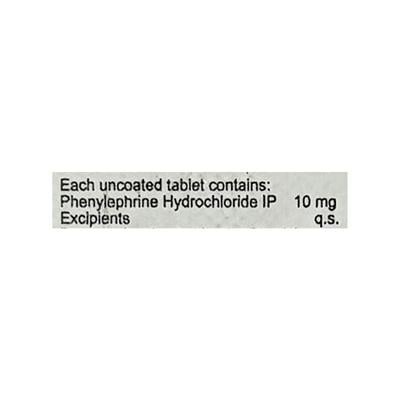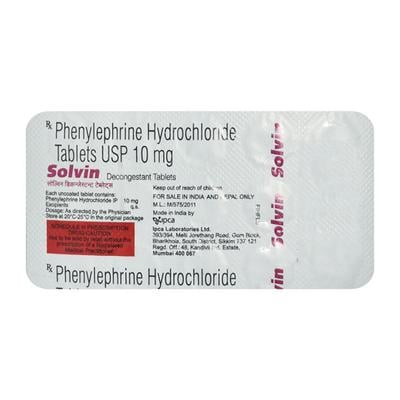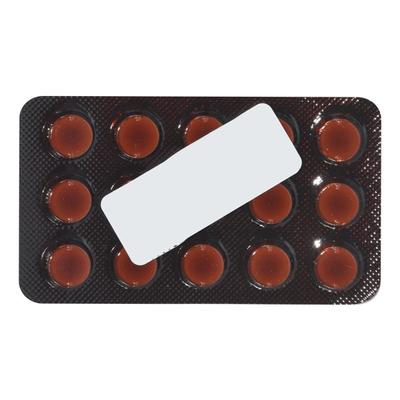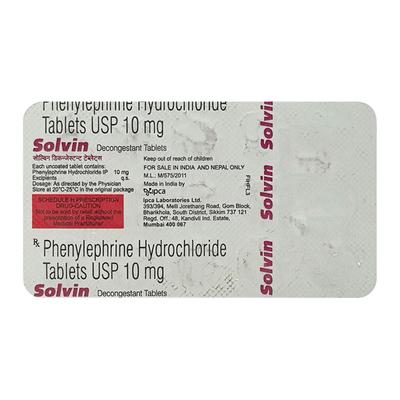

Netmeds First Membership
Quick Links
Introduction About SOLVIN DECONGESTANT TABLET
SOLVIN DECONGESTANT TABLET contains Phenylephrine which belongs to the group of medicines called Nasal decongestants. It is used for temporarily relief of sinus congestion and pressure.
SOLVIN DECONGESTANT TABLET is also used for temporary relief of nasal congestion due to common cold, hay fever or other upper respiratory allergies.
SOLVIN DECONGESTANT TABLET should be used with caution in patients with asthma, heart disease, high blood pressure, diabetes, thyroid disease. If you are pregnant or are breastfeeding, ask your doctor for advice before taking it.
SOLVIN DECONGESTANT TABLET should be used with caution in children above 12 years of age and in elderly patients. Consult your doctor before taking it.
The most common side effect of using SOLVIN DECONGESTANT TABLET are rebound nasal congestion due to overuse, especially when used longer than 3 days. Contact your doctor if your symptoms worsen.
Uses Of SOLVIN DECONGESTANT TABLET
For the temporary relief of:
- sinus congestion and pressure
- nasal congestion
How SOLVIN DECONGESTANT TABLET Works
SOLVIN DECONGESTANT TABLET works by reducing swelling of the blood vessels in the nasal passages. Thus helps to relieve nasal congestion and pressure.
How to use SOLVIN DECONGESTANT TABLET
Take SOLVIN DECONGESTANT TABLET as advised by your physician. Swallow the medicine with a glass of water. Do not crush or chew. Your doctor will decide the correct dose and duration for you depending upon your age, body weight or severity of infection.
Side Effects Of SOLVIN DECONGESTANT TABLET
Common
- rebound nasal congestion (especially when used longer than 3 days)
Uncommon
- restlessness, tremors
- headache
- insomnia
- stinging, burning, drying of nasal mucosa
Rare
Stop taking SOLVIN DECONGESTANT TABLET and contact your doctor immediately if you experience any of the following side effects:
- nervousness, sleeplessness or dizziness
- symptoms not improving within 7 days or occurrence of fever
How To Manage Side Effects
Headache:
Rest and relax. Drink plenty of fluids such as water or ORS (Oral Rehydrating Solution) and apply a pain-relieving balm on the head if necessary. Contact your doctor if your headache did not improve.
Warning & Precautions
Pregnancy
If you are pregnant or if you think may be pregnant or are planning to have a baby, ask your doctor for advice before taking SOLVIN DECONGESTANT TABLET.
Breastfeeding
If you are breastfeeding, ask your doctor for advice before taking SOLVIN DECONGESTANT TABLET.
Allergy
Do not take SOLVIN DECONGESTANT TABLET if you are allergic to Phenylephrine or any other ingredients of this medicine.
Lungs
SOLVIN DECONGESTANT TABLET should be used with caution in patients with asthma. Contact your doctor before taking it.
Heart Disease
SOLVIN DECONGESTANT TABLET should be used with caution in patients with heart disease, high blood pressure. Consult your doctor before taking it.
Others
Before taking SOLVIN DECONGESTANT TABLET, inform your doctor if you:
- have diabetes
- have thyroid disease
- have bowel obstruction
- have increased intraocular (eye) pressure
- have trouble urinating due to prostate gland enlargement
Use in pediatrics:
SOLVIN DECONGESTANT TABLET should be used with caution in children above 12 years of age and for children under 12 years, ask your doctor for advice before taking SOLVIN DECONGESTANT TABLET.
Use in geriatrics:
SOLVIN DECONGESTANT TABLET should be used with caution in elderly patients. Contact your doctor before taking it.
Interactions
A. Drug - Drug interactions:
Before taking SOLVIN DECONGESTANT TABLET, inform your doctor if you are taking any other medicines including non-prescription and herbal medicines.
- medicines used for depression (Ex. isocarboxazid, phenelzine, selegiline, amitriptyline, doxepin)
- linezolid (used to manage infections)
- ergotamine (used to manage migraine)
Overdosage:
If you or anyone else accidentally take too much of SOLVIN DECONGESTANT TABLET, consult your doctor immediately or visit the nearby hospital. Signs and symptoms of overdose include tachycardia (fast heartbeats), palpitations (particularly in patients with cardiac disease), dizziness, nausea, vomiting. Overdose in patients older than 60 years may result in hallucinations, CNS depression, fits.
Synopsis
| Drug | : | Phenylephrine |
| Pharmacological Category | : | Nasal decongestants |
| Therapeutic Indication | : | Nasal and sinus congestion |
| Dosage Forms | : | Tablet, Injection, Eye drops, Syrup |
More Information
- Keep SOLVIN DECONGESTANT TABLET out of reach of children
- Store SOLVIN DECONGESTANT TABLET below 25°C
FAQs About SOLVIN DECONGESTANT TABLET
Q: How often can I take SOLVIN DECONGESTANT TABLET?
A: Take SOLVIN DECONGESTANT TABLET as advised by your physician. Take 1 tablet every 4 hours. Do not take more than 6 tablets in 24 hours. Your doctor will decide the correct dose and duration for you depending upon your age, body weight and disease condition.
Q: What are the side effects of using SOLVIN DECONGESTANT TABLET?
A: The most common side effect of using SOLVIN DECONGESTANT TABLET are rebound nasal congestion due to overuse, especially when used longer than 3 days and occasional side effects include restlessness, nervousness, tremors, headache, insomnia, stinging, burning, drying of nasal mucosa. Contact your doctor if your symptoms worsen.
Q: Is SOLVIN DECONGESTANT TABLET safe for heart patients?
A: SOLVIN DECONGESTANT TABLET should be used with caution in patients with heart disease (including ischemic heart diseases), high blood pressure. Inform your doctor if you have any heart diseases doctor before taking SOLVIN DECONGESTANT TABLET.
Q: Can I stop using SOLVIN DECONGESTANT TABLET?
A: Do not stop using this medicine unless your doctor tells you to stop. Contact your doctor immediately if you experience any side effects like nervousness, sleeplessness or dizziness or if your symptoms not improving within 7 days or occurrence of fever.
Q: Who should avoid taking SOLVIN DECONGESTANT TABLET?
A: Avoid taking SOLVIN DECONGESTANT TABLET if you are currently taking monoamine oxidase inhibitors (used for depression, emotional or psychiatric conditions or Parkinson’s disease) such as isocarboxazid, phenelzine, selegiline or for two weeks after stopping this medicine. Contact your doctor for advice before taking SOLVIN DECONGESTANT TABLET.
Q: What should I do if I forgot to take SOLVIN DECONGESTANT TABLET?
A: If you forgot to take SOLVIN DECONGESTANT TABLET, talk to doctor before taking the next dose, as your management cycle may change. Do not take a double dose for the missed dose.
References
1. KD. Tripathi. Drugs Acting on ANS. Essentials of medical pharmacology. Eighth edition. 2019. Page - 148.
2. Robert. J. Kizior, Keith J. Hodgson. Phenylephrine. Saunders Nursing Drug Handbook. 2021. 29th edition. 2021. Page - 934 to 936.
3. Evan Richards, Michael J. Lopez, Christopher V. Maani. Phenylephrine. NIH National Library of Medicine, National Center for Biotechnology Information. StatPearls. July 2022. [Accessed on 6th January 2023] https://www.ncbi.nlm.nih.gov/books/NBK534801/
4. Paul J Desjardins and Roger G Berlin. Efficacy of phenylephrine. NIH National Library of Medicine, National Center for Biotechnology Information. PubMed Central. July 2007. [Accessed on 6th January 2023] https://www.ncbi.nlm.nih.gov/pmc/articles/PMC2048561/
5. Phenylephrine tablet. Daily Med: National Library of Medicine: National Institute of Health. [Revised in January 2021] [Accessed on 6th January 2023] https://www.dailymed.nlm.nih.gov/dailymed/fda/fdaDrugXsl.cfm?setid=5396a9cf-16eb-4628-9432-f49c67ffe2ce&type=display









